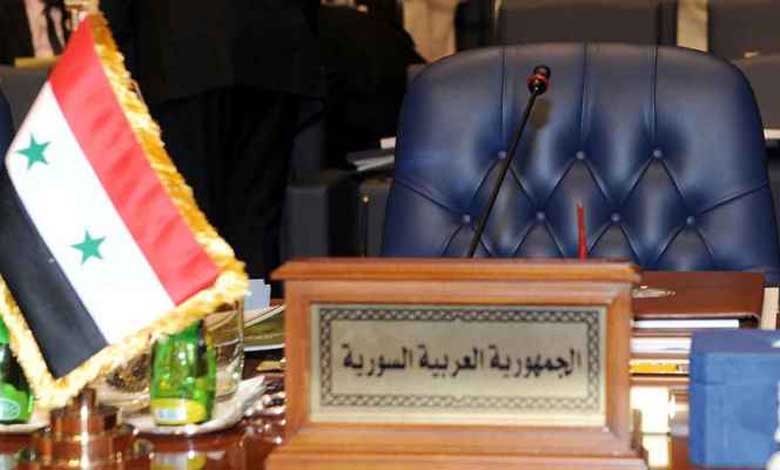Syria, imminent return to the « Arab family»

“The last weeks have witnessed significant developments in the direction of increasing Arab openness towards Syria, and hardly a day goes by without news of a new development in this direction, by intensive diplomatic contacts, meetings and high-level visits of an economic, or military-security nature, which makes observers expect Syria to return to the Arab lap and to occupy its seat in the Arab League after an absence of 10 years.”
The latest news was a phone call made by Syrian President Bashar al-Assad to Jordan’s King Abdallah II (October 3) for the first time since 2011. During the call, the king expressed Jordan’s support for “the independence of Syria and the unity of its territory and its people”. The Jordanian decision to resume flights between Amman and Damascus, to open the border between the two countries and to resume the movement of passengers and goods between them through the Jaber-Nasib crossing, Syria’s gateway to trade with Jordan and the Arab Gulf states, had already been called.
This decision was preceded by a visit to Jordan by General Ali Ayyoub, the Syrian Minister of Defense; Jordanian Armed Forces Joint Chief of Staff Maj. Gen. Ali al-Hunaiti met on Sept. 28 to discuss border security, counter-terrorism issues, drug trafficking and “future coordination on all common issues.” A high-level Syrian economic delegation also visited Amman to discuss economic cooperation issues between the two countries. Syrian Foreign Minister Faycal al-Meqdad met with his Jordanian counterpart Ayman Safadi on the sidelines of the UN General Assembly in New York.
Based on these intensive and fruitful contacts, many observers expect Jordanian King Abdullah II to visit Damascus soon.
Saving Lebanon, gains for Syria
It is known that the Jordanian capital of Amman had a meeting of oil and energy ministers in Egypt, Jordan, Syria, and Lebanon in the beginning of last month (September 8) to discuss measures to implement a plan to supply Lebanon with gas from Egypt “via Jordan and Syria” and electricity from Jordan “through Syria”, which is to be produced in additional quantities of Egyptian gas supplies. The United States adopted the plan based on an Egyptian-Jordanian proposal, and Washington supports its funding through the World Bank. The plan aims to save the Lebanese economy from collapse due to the severe shortage of electricity and fuel supplies, which could lead to chaos and catastrophic consequences in the region.
The plan, in all its details, seems to represent a major crack in the US stranglehold on Syria, whether under the Caesar Act or other harsh US and Western economic sanctions on Syria. “They reflect a clear slackening of the U.S. determination to stifle the Syrian economy, which is part of Washington’s move to abandon its direct military presence in the Middle East, and to focus its strategic weight in East Asia to counter the Chinese rise.”
This trend also comes in light of the Syrian army’s major victories over terrorism and the fact that Syrian forces control about 70 percent of the country’s territory – including control of Deraa and its countryside – given the great strategic importance of this area along the Jordanian and Israeli borders.
Political and economic gain
The gas and electricity supply plan for Lebanon is yielding important political gains for its four parties; in addition to its obvious economic gains, Egypt and Jordan are making a very important gain in terms of status and regional role. The “savior” gas is Egyptian, and Jordan is the first transit country for that gas, producing the additional electricity urgently needed to save the Lebanese economy.
Cairo and Amman played an important role in contacts between the U.S. and Russian sides, in preparation for the plan within the framework of U.S.-Russian understandings on Syria and Lebanon; These understandings save the economies of both countries, and Lebanon’s normal relations with Syria, its neighbor and historic economic partner, are “officially” removed from the sanctions, after years of “disassociation” from them.
Syria breaks the crippling U.S. and Western blockade. It receives practical recognition of the failure of the Caesar Act, which will pave the way for greater gains at the Arab and international levels in terms of enhancing the legitimacy of President Assad’s rule and its imminent return to the Arab League, as well as in terms of facilitating progress towards a settlement and moving towards reconstruction.
We believe that the expected visit of the Jordanian King to Syria will open the door for higher-level Arab contacts in Syria, especially after the recent meetings of the Egyptian and Syrian Foreign Ministers on the sidelines of the United Nations meetings. “Minister Sameh Choukri is scheduled to visit Moscow at Lavrov’s invitation, which is seen as closely linked to the settlement in Syria, Egypt’s role in this settlement, and the softening of the Arab atmosphere towards Damascus.” This makes it possible to expect Damascus to return to the Arab League soon, Syria to attend the next Arab summit, and Syria’s full return to the Arab fold.












